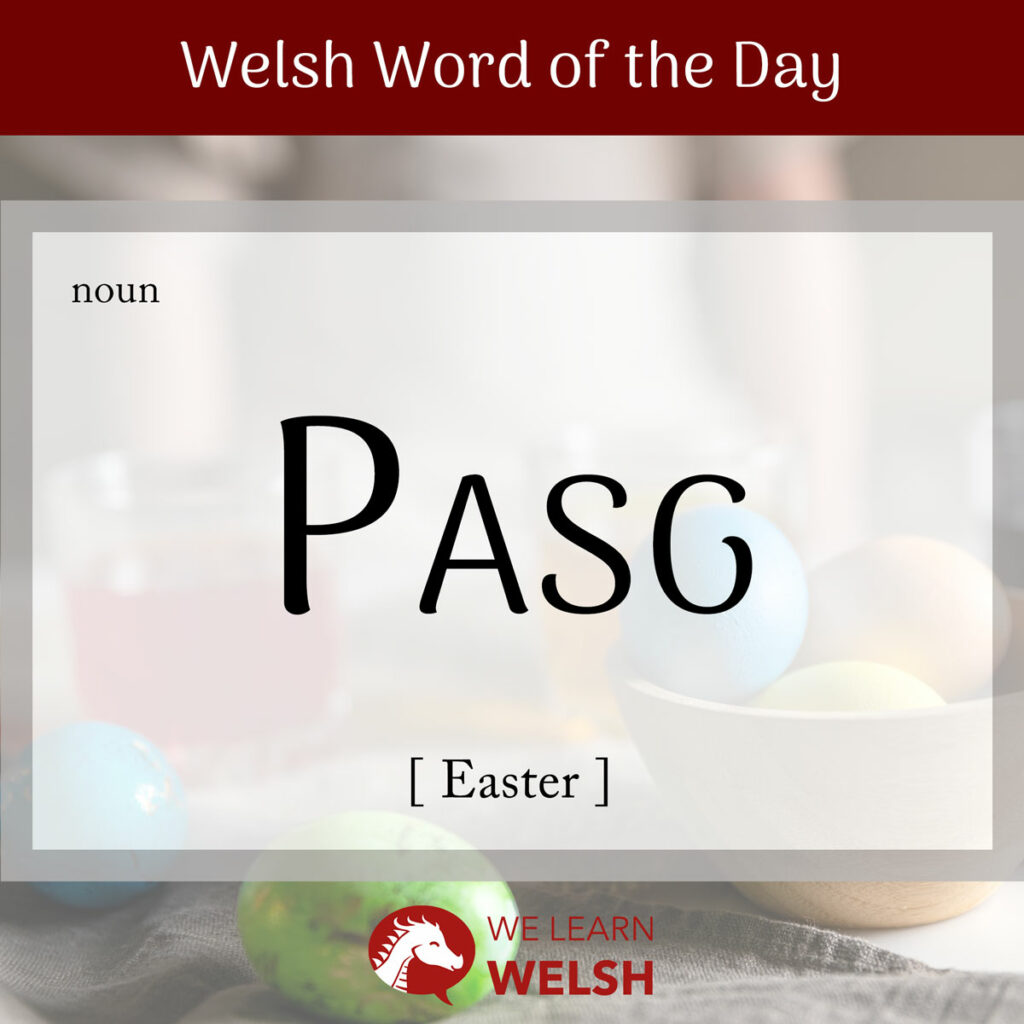Pasg (Easter) is a gŵyl (holiday) that’s important to many people. You might celebrate Pasg because you are a Cristion (Christian), commemorating the resurrection of Christ, to honour even older cultural and spiritual traditions surrounding the advent of gwanwyn (spring), or simply as an excuse to see family and eat some siocled (chocolate)!
And all this is no less true of Cymru (Wales) than anywhere else in the UK. In a country full of natural beauty that shines in the springtime, which has a rich history of both Christian and indigenous pagan traditions and celebrations, Pasg is a really lovely time of year.
Pasg / y Pasg
Easter
In North Wales, Pasg is pronounced a bit more like this:
These days, for most people, Pasg is seen as a secular holiday which is more about celebrating the warming weather and enjoying some fun traddodiadau (traditions) than anything else.
However, the etymology of this Welsh word reveals its religious roots, as it derives ultimately from the Hebrew word pesah, referring to the holiday Passover. For this reason, Pasg in Welsh means both Easter and Passover, rather than the holidays having different words as in English. But you can also use Pasg yr Iddewon (Jewish Passover) if you want to be more specific.
Pesah became paskha in ancient Greek, and pascha in Latin, through which it evolved to provide the word for Easter in most modern European languages – see the Italian Pasqua, the Danish påske, and the Irish Cháisc. In this case, English is actually the odd one out!

Pasg is also often referred to as y Pasg, and if you are talking about specifically Easter Sunday, you can say Sul y Pasg or dydd Sul y Pasg, while Easter Monday is Llun y Pasg or dydd Llun y Pasg.
Another case where you will see Pasg used with the definite article is when you are talking about the Easter Bunny (Cwningen y Pasg). The latter is often just called Bwni’r Pasg, too, and in this case the form yr is used and contracted with the word Bwni, because it ends in a vowel.
Mae Bwni’r Pasg yn cuddio’r wyau.
The Easter Bunny is hiding the eggs.
Pasg is a masculine noun, which is why it hasn’t mutated after the definite article y / yr in the examples above. Its plural form would be Pasgau.
Soft mutation
Basg
Nasal mutation
Mhasg
Aspirate mutation
Phasg
To dymuno (wish) someone a Happy Easter, you can simply say Pasg Hapus! Remember that in Welsh the adjective comes after the noun, and the same is true in holiday greetings.
To be more specific and say Happy Easter to you, use Pasg hapus i ti or Pasg hapus i chi. The former is for someone you know well, and the latter is more formal, used either for someone you don’t know, or for when you’re addressing multiple people.
You might want to accompany your Easter well wishes with a little gift of blodau (flowers) or siocled – particularly an wy siocled (chocolate egg). More specifically, an Easter egg is wy pasg (pl: wyau pasg), sometimes spelt ŵy pasg. Real wyau are a common choice for breakfast on Sul y Pasg, as are teisennau croes (hot cross buns, literally cross cakes).
My personal favourite part of dathlu Pasg (celebrating Easter) is coming up with clues for the helfa wyau (egg hunt), but as a child I also used to love peintio wyau (painting eggs) for rholio wyau (egg rolling). In the UK, egg rolling is often called pace-egging. This term pace comes from the same Hebrew root as the Welsh Pasg.
Pwy sy’n edrych ymlaen at y Pasg?
Who’s looking forward to Easter?
Pasg is arguably the most important date on the Christian calendar, so a lot of the symbolism we see around Easter time includes croesau and palmwydd (palms).
On the secular side of things, imagery of cywion (chicks) and ŵyn (lambs) are often used alongside cwningod (rabbits) to represent the new life we associate with gwanwyn. Still, much of the most important Easter vocabulary you’ll need to know relates to the crefyddol (religious) element of the holiday.
- Iesu Grist = Jesus Christ
- (Dydd) Gwener y Groglith = Good Friday
- croes = cross
- croeshoeliad = crucifixion
- Diwrnod Cablyd / (Dydd) Iau Cablyd = Maundy Thursday
- eglwys = church
- y Grawys = Lent
- (Dydd) Marwth Ynyd = Shrove Tuesday
- Sulgwyn = Pentecost
- (Dydd) Sul y Blodau = Palm Sunday
Did you know that the reason Palm Sunday is known as Sul y Blodau (Flowers Sunday) in Wales is that it is a Welsh Palm Sunday tradition to decorate loved ones’ graves with flowers?
Aethon nhw i’r eglwys ar gyfer Sul y Pasg.
They went to church for Easter Sunday.
Other Welsh Pasg traditions include clapio wyau (egg clapping) in Anglesey, in which children would visit farms clapping and singing to ask for eggs, and trin gwely Iesu (making Christ’s bed) in Pembrokeshire, which refers to making an effigy of Jesus on the cross to be left in a meadow.
It was also customary in Pembrokeshire up until the late 1800s to walk troednoeth (barefoot) around Easter time, particularly when walking to the eglwys, a show of respect to the daear (earth) and the new life beneath it. Streets were also kept clean of vehicles and machinery. You might even encounter some people in south-West Wales, especially religious people, who continue to keep these traditions to this day!
How do you like to dathlu’r Pasg? Do you have any unique ways of celebrating that you’d like to share? Or would you consider trying out one of these old Welsh arferion (customs)?

